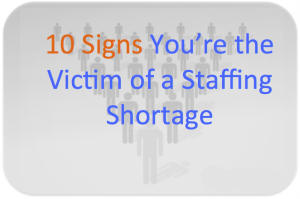Products

Who We Serve
July 8, 2014
Over the past few weeks, we’ve talked extensively about the staffing shortage in health care IT and discussed a variety of ways to address the problem. Most recently, we discussed staffing benchmarks and revealed the difficulty in identifying the ideal staffing size.
It’s difficult to know if your hospital is properly staffed, and while open positions points to a shortage, how are you to be sure? How can you be certain that your hospital is suffering from an IT staffing shortage? Here are ten signs to watch out for:
 1. Unhappy Staff: People who work in health care typically do so because they want to make a difference. When you’re short staffed, declining satisfaction levels are inevitable as employees become frustrated that they can’t seem to get ahead of the list of important projects that will make a difference to the organization.
1. Unhappy Staff: People who work in health care typically do so because they want to make a difference. When you’re short staffed, declining satisfaction levels are inevitable as employees become frustrated that they can’t seem to get ahead of the list of important projects that will make a difference to the organization.
2. High Turnover: Frustrated employees get burned out and quit. This leaves you to bear the costs of identifying and training new hires. Unfortunately, while the new team members are getting up to speed – at least a year for most – you have even less delivery capacity on your staff, leading to a vicious spiral of more overwork and frustration.
3. Project Deadlines Are Slipping: The same projects come up in status meetings week after week, because nothing is getting completed. The worst manifestation of this is when your team doesn’t even want to commit to dates because they know that anything that appears reasonable is also impossible.
4. Declining Quality: As overwork grows, less time is spent on quality analysis and testing. This leads to more errors, more rework, and another vicious spiral.
5. Managers and Staff Who Should Be Working Projects Are Doing Production Work: In most hospital IT shops, the managers and senior staff spend significant amounts of their time on project work, and the balance of the staff usually performs the production work – the everyday tasks like backups, reports, and file transfers. When the senior staff ends up doing more production activities, because they are fixing previous issues, covering vacations, or because no one else has the time, you’ve got your highest value staff performing the lower value work, and staffing problems are a likely reason for it.
6. Delay of Non-mandatory Projects: There are many critical IT projects that simply must be completed for the hospital to stay in business, e.g. regulatory upgrades like ICD-10 and Meaningful Use / MIPS, and replacement of systems that are at end-of-life. When other projects can’t begin because the critical items are occupying the staff’s bandwidth, that’s a staffing problem. It might be temporary, such as the overlap of major projects upgrading for ICD-10 and Meaningful Use / MIPS simultaneously, but particularly when this happens year after year, you should suspect a staffing shortage.
7. Customer Satisfaction Decreases: Short staffing doesn’t cause this directly, of course, but slipping deadlines and declining service quality do. Indications that customers are unhappy should cause you to evaluate your staffing.
8. Your Staff Frequently Ends Up In Firefighting Mode: It’s health care, the day’s plan can be easily overcome by critical events. When this becomes the norm, however, staffing is probably an issue. In particular if you ever hear an employee say, “ I don’t have a plan for tomorrow – I’ll just show up and see who’s yelling the loudest!” you should immediately reassess your staffing levels.
9. Increased Overtime / Weekend Work: Many of us are fortunate to have dedicated staff who are willing to work extra hours to make sure that critical projects are completed. As the number of extra hours climb, however, you wind up with increasing costs, burnout, and turnover.
10. Declining Use of Vacation Days: As an extension of needing to work extra time, dedicated employees may not be able to use all of their time off, and this is a contributor to burnout and turnover.
Do you see several of these signs occurring at your hospital? Phoenix can help. With a variety of services, including staffing assessments, augmentation, and project management, we can help you assess your needs and map out a strategic plan to address your staffing requirements.
Contact us or Request a Consultation.